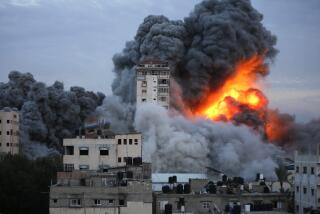Dissect the Iraq Data
- Share via
Foreign intelligence is inherently murky and flawed. How reliable is the information local agents are supplying? Has the defector really defected -- or is he or she a double agent? During the Cold War, disputes raged about how many missiles the Soviet Union could field and was building. The Soviet economy was judged to be much stronger than it actually was.
It all can lead to outright madness, as in the case of famed CIA analyst James Jesus Angleton, who in the 1970s began a one-man witch hunt for supposed moles inside the agency, paralyzing its work.
However imperfect intelligence might be, it has to be scrutinized after the fact to find out what went wrong and right. The only way to improve is to see how the past came out. The Bush administration is now in that position.
Last October, Defense Secretary Donald H. Rumsfeld asked CIA Director George J. Tenet to compare intelligence estimates concerning Iraq with what might be found in Iraq should war come. The CIA is currently doing that, using Iraqi documents and interrogations of former officials.
The administration’s assertions about Iraqi possession of weapons of mass destruction before the war were categorical. Vice President Dick Cheney declared that Saddam Hussein was seeking to develop nuclear weapons. Secretary of State Colin L. Powell appeared before the United Nations Security Council, with Tenet sitting behind him, to allege a series of Iraqi weapons-of-mass-destruction programs. Yet next to nothing in the way of such weapons has yet been found in Iraq.
The accuracy of U.S. intelligence is one question. Another is the influence of the Pentaton’s so-called Special Plans intelligence unit, dealing with estimates and led by neoconservative scholar Abram Shulsky. Deputy Secretary of Defense Paul D. Wolfowitz, who was impatient with the CIA, championed the creation of the hawkish unit. Did the Pentagon unit, which fed information directly to President Bush, bulldoze more cautious CIA analyses?
The House and Senate intelligence committees have rightly asked Tenet for a report. If the report is inadequate, lawmakers should insist on an outside team of experts with government and academic experience to assess the quality of intelligence at the CIA and other agencies.
As the Bush administration begins to make the same charges about Iran that it made about Iraq -- that it is developing nuclear weapons and harboring Al Qaeda agents -- questions about the reliability of its assessments are more urgent than ever.
More to Read
Get the L.A. Times Politics newsletter
Deeply reported insights into legislation, politics and policy from Sacramento, Washington and beyond. In your inbox twice per week.
You may occasionally receive promotional content from the Los Angeles Times.










